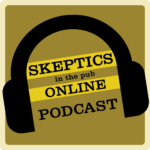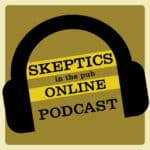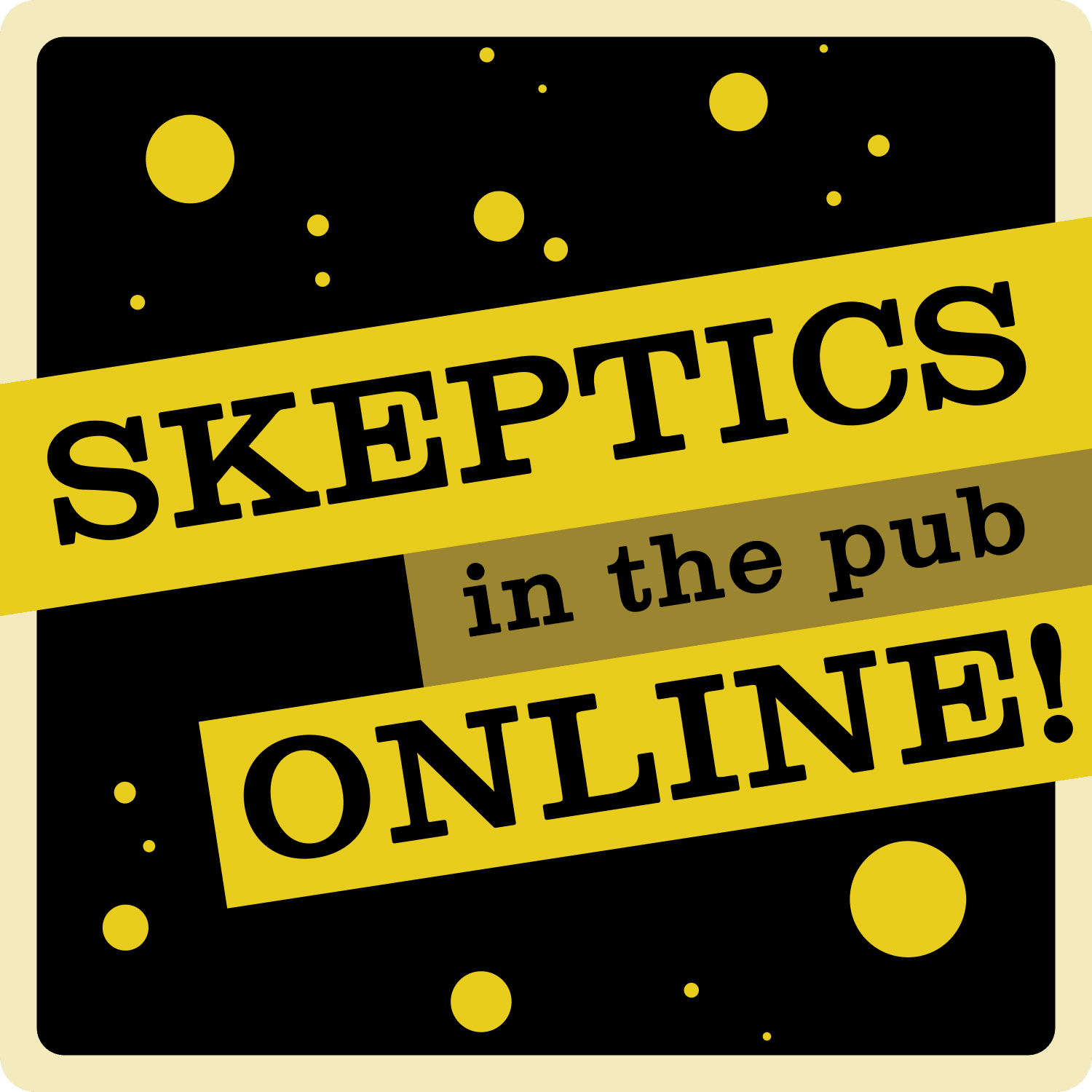This is the podcast version of the Skeptics in the Pub Online live-streamed talks. We take the audio and give it to you in a nice easy podcast feed for you to listen at your pleasure. All of the talks are still available on our YouTube channel if you want to see any visuals/slides/etc. We release the live shows as we do them on the 2nd and 4th Thursday of each month and on weeks when there isn't a live show, we release an episode from the archive.
Podcast
Snake Oil on the Shopping List? How Pseudoscience Ends Up in Your Shopping Cart – Dr Rebecca Wismeg Kammerlander

From biodynamic veggies to detox cures, our supermarkets are full of products that are pure woo. One moment you’re picking up cold medicine, the next you’re eyeing a bottle of homeopathic sugar pearls. You finally decide to get started with a skin care routine, a moment later your money ends up in the pocket of an anthroposophical brand. And those carrots … are they just organic or are they grown in tune with moon cycles and fertilized with some magic concoction made of a shit-stuffed cow horns?
Let’s unpick why pseudoscience is so at home among ordinary goods like apples and aspirin and why, at times, products that are gobbledygook end up in the shopping baskets of even the savviest skeptical minds.
Rebecca is an Austrian Studies Scholar who one day woke up as a marketing executive. She is a Visiting Research Fellow at King’s College London, where she has previously been a lecturer in German and European Studies, as well as a literature enthusiast and a material culture geek.
Her main areas of interest are Austrian literature and culture, consumer culture, and the construction and portrayal of identities. In her PhD research (completed in 2021 at King’s) she examined consumer objects, identities, and author brands in post-2000 Austrian literature, unpicking the emergence of the national brand of Austria and introducing the concept of “”Consumer Literacy”” – the skill of reading the narrative value of consumer objects – to literature research.
The music used in this episode is by Thula Borah and is used with permission.
God Awful Gaming – Noah Lugeons

In this talk, Noah Lugeons combines two of his passions; video game history and terrible Christian media. In so doing, he explores both the history of Christian video games and the larger role that Christianity has played in the development of secular games. In a who’s who of the worst video games of all time, Noah will guide the audience through a half century of digital cross-gathering, Sunday school attending, Christ-praising, Bible-verse collecting, and baby throwing.
Noah Lugeons is a podcaster, author, and atheist activist. He’s the host of The Scathing Atheist, the 2014 Podcast Award winner for Best Religious Podcast, and God Awful Movies, which has been recorded live at the largest atheist conferences in the US, the UK, and Australia. He’s the author of several books on the subject of atheism. His most recent book, Outbreak: A Crisis of Faith – How Religion Ruined Our Global Pandemic examines religion’s role in America’s error riddled response to the COVID-19 crisis. He temporarily resides in rural South Georgia, but not temporarily enough.
The music used in this episode is by Thula Borah and is used with permission.
The Progressive Parent: Kavin Senapathy on science, justice, and the future of humanity – Kavin Senapathy

What adults do for children today is shaping how humanity will ultimately fare. How can parents and other adults leverage information and resources to oppose bigotry and do the best for kids? In this presentation, Kavin Senapathy will discuss their book, The Progressive Parent: Harnessing the Power of Science and Social Justice to Raise Awesome Kids. From protecting babies and children from harmful chemical exposures to the truth about the gender and sex binaries, they will shed light on how to level up individual and collective approaches to raising children.
Kavin Senapathy is an award-winning science journalist and author of The Progressive Parent: Harnessing the Power of Science and Social Justice to Raise Awesome Kids (Hanover Square Press). Senapathy’s writing can be found in SciShow, Scientific American, SELF, Salon, Forbes, and more. A member of the National Association of Science Writers and the American Society of Journalists and Authors, their work delves into a slew of seemingly disparate but interconnected beats, from genomics to racism in society and medicine to food and health.
The music used in this episode is by Thula Borah and is used with permission.
Atheism, Religion, and Human Nature: The Evolutionary Puzzles of Faith and Atheism – Dr Will Gervais

We’re all members of a very strange species. But where lots of human peculiarities – from art to warfare and beyond – have analogues across the animal kingdom, we stand alone as the only religious species. Yet, within our otherwise religious species, atheism is currently flourishing in large parts of the world. I’ll discuss research highlighted in my recent book (Disbelief: The Origins of Atheism in a Religious Species), showing how people’s intuitions about morality lead them to assume the worst of atheists – with problematic implications for our scientific understanding of atheism, religion, and human nature.
Will Gervais (Centre for Culture and Evolution, Brunel University London) is a cultural evolutionary psychologist and has been a global leader in the scientific study of atheism for over a decade. Dr. Gervais’s research has been featured in media such as the New York Times, the Washington Post, National Public Radio, Der Speigel, Psychology Today, Vox, and Scientific American. His interdisciplinary work, lying at the intersection of cultural evolution, evolutionary psychology, and cognitive science, has garnered international scientific recognition. He was named a Rising Star by the Association for Psychological Science and is the recipient of the Margaret Gorman Early Career Award from the American Psychological Association and the SAGE Young Scholar Award from the Foundation for Personality and Social Psychology. Will likes cooking, camping, and his dog.
The music used in this episode is by Thula Borah and is used with permission.
SitPO – Skepticamp 2024 – Talk 16 – Is the Smoking Gun Enough? – Ben O’Brien

This audio is a part of the Skepticamp 2024 event, that happened on October 18th 2024 in Mercure Piccadilly Hotel, Manchester and was livestreamed at https://www.twitch.tv/sitp
About the talk:
In spite of advancements in the field of forensic science, questionable practices and outright unproven methods still often get admitted into American court rooms. We’ll explore some examples of this happening, some intractable problems in some methods that may seem reliable, and the reasons why there’s even a chance of nonsense being admitted into court.
About the speaker:
Ben O’Brien (BSc, MSc) has a masters in Forensic Science from Virginia Commonwealth University and currently works as a forensic DNA analyst for a private company based out of northern Virginia, primarily analyzing sexual assault kits to aid Illinois State Police in preventing backlogs by ensuring all cases have evidence processed within 6 months.
The music used in this episode is by Thula Borah and is used with permission.
SitPO – Skepticamp 2024 – Talk 15 – What Mental Health Crisis? Psychiatrization & Social Media – Shayna Weisz

This audio is a part of the Skepticamp 2024 event, that happened on October 18th 2024 in Mercure Piccadilly Hotel, Manchester and was livestreamed at https://www.twitch.tv/sitp
About the talk:
1 in 8 people globally are affected by a mental disorder, yet despite research, knowledge and awareness efforts, mental health is still increasing at an alarming rate. Could there be something misleading us in the data, an underlying reason why so many are identifying as mentally ill these days that is being overlooked? I will explain the concept of the “psychiatrization of society” as a possible explanation, in particular exploring social media’s role in the increasing pathologization of normality.
About the speaker:
Shayna is a PhD student at the University of Birmingham studying the gendered nature of modern mental health discourse & the psychiatrization of society. Her goal is to uncover and expose pseudoscience and sexism within psychiatry.
The music used in this episode is by Thula Borah and is used with permission.
SitPO – Skepticamp 2024 – Talk 14 – Why can’t they just behave? – Caradoc Gething

This audio is a part of the Skepticamp 2024 event, that happened on October 18th 2024 in Mercure Piccadilly Hotel, Manchester and was livestreamed at https://www.twitch.tv/sitp
About the talk:
The dubious rants of an aging teacher, regarding discipline and punishment in schools and why we’ve never had it so bad, or good, depending on who you listen to.
About the speaker:
Caradoc is returning to Skepticamp for another year, hoping to prove that quantity is not necessarily quality. This year, fresh from joining a new school in September, he is embarking on his 24th year destroying the hopes and dreams of children in education. A keen lover of sport, vegetables and politics, he is extremely glad his brother lasted longer as Welsh First Minister than Liz “Lettuce” Truss. Will His daughters get a mention in this year’s talk? Who knows! His favourite Gladiator is Fury
The music used in this episode is by Thula Borah and is used with permission.
SitPO – Skepticamp 2024 – Talk 13 – A Comedy of Errors (and Overcrowding) – The Prison Population Crisis – Emma McClure

This audio is a part of the Skepticamp 2024 event, that happened on October 18th 2024 in Mercure Piccadilly Hotel, Manchester and was livestreamed at https://www.twitch.tv/sitp
About the talk:
Last year prison lawyer Emma ran a long way to make an over-laboured point about prison conditions. The sequel calls for an even more ridiculous stunt… So Emma will be running in circles at a prison for 52 miles.
Our prisons are full to bursting. The situation is so bad that by soon thousands will be released before they have served even half of their sentence. In this talk Emma will clear up exactly how we got here, how it has been brewing for a long time and the facts about ‘early’ release.
About the speaker:
Emma is a former QED main stage speaker and solicitor specialising in prison and public law. She regularly represents prisoners before the Parole Board. In what is left of her spare time, Emma enjoys running and boring other people about how much she enjoys running.
The music used in this episode is by Thula Borah and is used with permission.
SitPO – Skepticamp 2024 – Talk 12 – Who owns AI?- Phil Armstrong

This audio is a part of the Skepticamp 2024 event, that happened on October 18th 2024 in Mercure Piccadilly Hotel, Manchester and was livestreamed at https://www.twitch.tv/sitp
About the talk:
Proponents of AI promise that AI will lead to the the democratisation of knowledge, but it is ultimately owned by various companies and investors. Who are these people and what are their goals for AI?
About the speaker:
Phil is a professional software engineer and an amateur board member of the Merseyside Skeptics Society and The Skeptic magazine
The music used in this episode is by Thula Borah and is used with permission.
Skepticamp 2024 – Talk 11 – Postnatal Psychosis and me – Karin McClure

This audio is a part of the Skepticamp 2024 event, that happened on October 18th 2024 in Mercure Piccadilly Hotel, Manchester and was livestreamed at https://www.twitch.tv/sitp
About the talk:
A talk about my experience literally losing the plot with Postnatal Psychosis and what it’s like to experience psychiatric care on the NHS
About the speaker:
Karin is a artist/skeptic based in Liverpool.
The music used in this episode is by Thula Borah and is used with permission.
